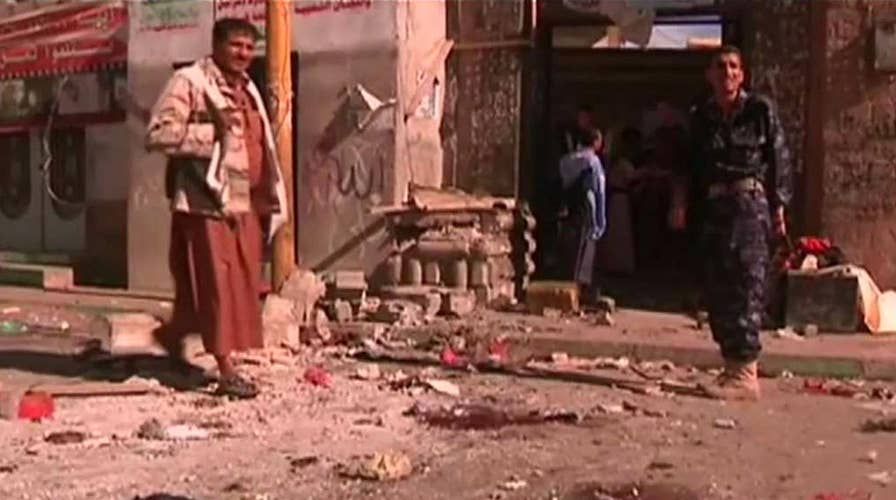US continues to hammer Al Qaeda with airstrikes in Yemen
Jennifer Griffin reports from the Pentagon
The Trump presidency was just days old when it recorded its first US combat casualty. Chief Special Warfare Operator William “Ryan” Owens—a Navy SEAL, Illinois native, and father of four—died of wounds sustained in a firefight during a raid on an al-Qaeda compound in Yemen.
The now controversial raid was designed to seize phones and laptops and gather other intelligence from the increasing threat of al-Qaeda in the Arabian Peninsula (AQAP). In addition to the death of the Navy SEAL, the raid last month may have killed up to 24 innocent citizens, according to claims emerging from Yemen, including the eight-year-old daughter of American-citizen-turned-terrorist, Anwar al-Awlaki, who was himself killed in a drone strike in 2011 (that same year, Awlaki’s 16-year-old son was killed in another strike ordered by President Obama).
As the spokesman for US Central Command, Colonel John J. Thomas, said of the US raid on the al-Qaeda compound, AQAP “has a horrifying history of hiding women and children within militant operating areas and terrorist camps, and continuously shows a callous disregard for innocent lives. That’s what makes cases like these so especially tragic.”
Here the United States faced the dilemma that its ally Saudi Arabia and other members of the coalition have faced since they launched their war in March 2015 on Iranian-backed Houthi rebels who overthrew the legitimate, elected government of Yemen.
For Saudi Arabia, the Houthi-Iranian alliance and control of Yemen represented a serious threat. Left unchallenged, North Yemen could become another southern Lebanon, with an Iranian proxy actively working to subvert Saudi national security. Without intervention in Yemen, Saudi Arabia’s citizens faced the risk of a hostile militia with thousands of missiles aimed at them on the kingdom’s southern border.
Some have claimed that Saudi Arabia has exaggerated the threat posed to its security by the Houthis and their Iranian backers, even arguing that evidence of this alliance is limited. This ignores the facts and the plentiful public evidence to the contrary.
In the last 18 months, the US Navy has intercepted four arms shipments from Iran to Yemen. Iran itself has claimed numerous times that it controls four Arab capitals, including Sana’a, and the Houthis have become closely tied to Hezbollah, Iran’s Lebanon-based political and military proxy.
Hezbollah leader Hassan Nasrallah has claimed the Houthi cause as his own, allowing Houthi communications and propaganda efforts to set up in the southern Hezbollah-controlled suburbs of Beirut. He has publicly welcomed Houthi fighters to train with his forces. Videos on YouTube show Lebanese Hezbollah trainers and Farsi-speaking targeting specialists inside Yemen helping Houthis fire missiles at Saudi military ships.
Despite these challenges, and nearly two years into one of the most difficult military operations taking place in the Middle East, Saudi Arabia and its coalition partners have largely achieved their objectives: to disrupt Iranian arms deliveries and to make clear to the Houthis that their alliance with Iran will be costly.
But success in war never comes without sacrifice. Unfortunately, Yemeni civilians have paid a high price, with an estimated 10,000 killed since the conflict began. Subsequently, Saudi Arabia has faced allegations that its forces are committing war crimes against the civilian population in Yemen. There have been suggestions that US military support for the war should be terminated.
This is a nonconventional war, where the enemy is not a formal army but a militia that deliberately hides among an innocent population, and where the enemy conceals its bases and facilities in close proximity to civilian facilities. Saudi forces must surely review their own tactics to avoid as many civilian casualties as possible. But it’s important to not gloss over the tactics of the Houthis, which include, as reported by Freedom House, “indiscriminate shelling of populated areas, extrajudicial killings, arbitrary detention, and enforced disappearances.”
This is what Saudi Arabia faces doing battle against the Houthi rebels, a dangerous force that is guided, funded and armed by Iran. None of this diminishes the tragedy these civilian casualties represent. Rather, it reinforces the urgent need to defeat the Houthis, end the conflict in Yemen, and invest in a long-term political solution to peace.





















